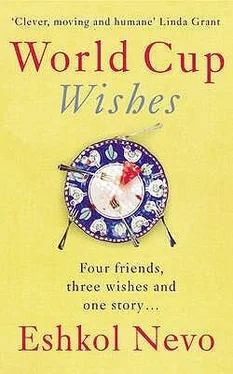*
During the summer holiday between junior and senior years in high school, I was supposed to pick up Churchill and drive down to South Beach with him. When I turned into his street, I saw from the distance that he wasn’t alone. Standing with him in front of the building were two other guys from school whose faces I knew, but not their names. I turned the car around and drove away. I didn’t feel like going to the beach in a big group. I wanted to go to the beach with Churchill, just the two of us, and I hated that he’d invited other people to come along without asking me. As if my being short made my opinion irrelevant. As if the fact that he was the great Churchill meant he could do whatever he wanted. So what if I was the only one who had a driving licence, I thought bitterly, that doesn’t mean I have to be the driver for the entire class.
Two traffic lights later, I turned around and drove back to his street. It’s not nice, I thought. He’s sitting there outside, waiting for me. And only yesterday we ran all the way to the university and he kept slowing down so I could keep pace with him.
The two guys whose names I didn’t know jumped into my back seat the minute I pulled up. The curly-haired one had too-long legs, and his knees were embedded in the back of my seat like spears.
Churchill sat down in the passenger’s seat, pointed to them and said to me, that’s Ofir and that’s Amichai. Then he pointed at me and said, this is Yuval, the guy I told you about.
Hi, I said coldly without turning my head. And started to drive. A pine tree twig got stuck in my wipers and I couldn’t get it out no matter how many times I turned them on.
So, ah … Yuval, the curly-headed one said, maybe you can help us with a little argument we’ve been having. What do you think is the right way to say it: Haifaite or Haifian?
Haifaite.
I told you so! the curly-haired one exulted and stuck his knees deeper into my back.
So how do you explain that the announcers on the Saturday afternoon football broadcasts always say ‘Haifian’? the other one grumbled.
Not all the announcers, curly-hair answered, only Zoher Bahalul. And he’s an Arab.
But Zoher Bahalul speaks the best Hebrew on the programme.
Bullshit.
You know what, I have an idea! Maybe instead of going to the beach, we should drive to the Academy of the Hebrew Language and ask them.
What a brilliant idea, curly-hair ridiculed. The Academy of the Hebrew Language is in Jerusalem. You want to drive to Jerusalem now, Amichai?
No, but they must have a branch in Haifa. They have branches all over the country, don’t they, Churchill?
Why didn’t you st-o-o-op? Churchill suddenly cried.
What? Where? What happened? I said in alarm.
Didn’t you see?! At the hitchhikers’ stop!! Noya Green and that girlfriend of hers, what’s her name, Eliana.
But, Churchill, I stammered, there’s no room … there’s no room in the car for them.
Yuval, Yuval, what is it with you? Churchill whacked the back of my neck. For girls like Noya and Eliana, there’s always room! They could always have sat on me.
The passengers in the back seat burst out laughing, but their laughter was cut short by Churchill himself.
You two, he said, turning his body towards the back, you two have nothing to laugh about. It’s all because of your stupid arguing. If it wasn’t for you, Yuval would have seen Noya Green at the stop.
Curly-hair and the one next to him were silent. So was Churchill. Perhaps he was imagining what might have happened if Noya Green had joined us –
As I kept driving down to the sea, I thought, that twig, the minute we get to the beach, I’ll pull it out from under the wipers, and I thought, if I step hard enough on the accelerator now, we’ll fly into the air and land in the water, a soft landing, and I thought, two more hours, two and a half at the most, with these three clowns, then I’ll go home and never have to see them again for the rest of my life.
On the way back from the shop which had printed the final version of the manuscript — which included the last scene and was apparently meant to be handed over for final copy-editing the next day — my beloved friend Yuval Freed drove into the car stopped in front of him at the traffic lights on the corner of Einstein and Brodetzki Streets. He didn’t hit it hard: the damage to both cars was minor and included a broken headlight and slightly bent bumper. Nothing more.
What happened after that is shrouded in fog. To this day, there has been no clarification of the precise order of events that had such tragic results.
It appears that Mr Kfir Kliger, the driver of the car that was hit, got out of his vehicle and walked over to Mr Yuval Freed, opened the car door and pulled him out by the collar. They apparently had a short argument, accompanied by mutual shoving.
Witnesses for the prosecution reported that Mr Kliger was the attacker, and that Mr Freed was focused on trying to ward off the attack on him. Witnesses for the defence, on the other hand, claim that Mr Freed was equally responsible for the argument and the shoving.
From my years’ long acquaintance with Mr Freed, with his characteristic restraint and mild manner, I tend to accept the first version, despite the fact that it cannot be denied that in this book Mr Freed himself claims that there was a little hooligan inside him, and ‘perhaps in all men’.
Be that as it may, after several minutes of mutual provocation, Mr Kliger went and got an army club from his car and hit Mr Freed in the stomach with it several times. Then in the head.
Mr Freed fell unconscious onto the blazing tarmac and was taken to Ichilov Hospital by Mr Kliger himself.
A routine report from a volunteer worker for the Our Right NPO, who was in the hospital at the time, reached Mr Amichai Tanuri’s beeper, and so, within half an hour, all of us — Amichai, Ofir, Maria, Ya’ara and myself — were standing in the corridor outside the intensive care unit.
The treatment Mr Freed received was irreproachable. As was the manner in which the team treated us during the long hours of waiting. Cynics would undoubtedly claim that Mr Tanuri’s presence is what caused the hospital staff to treat us with so much care and sensitivity. However, in this case, I am unable to agree with them. As far as I could tell, the attending physician, Dr Eitan, is not the sort of person who needs special reasons to show sensitivity to his patients. He is a young man — almost our age — whose professional honesty and ability to infuse his surroundings with his humanistic spirit are remarkable and inspire me with hope that — perhaps — we have been blessed with a new generation of doctors.
After an eighteen-hour struggle, Dr Eitan came out of the operating room and told us and Mr Freed’s parents that his life was no longer in danger, but there was no way of knowing when he would regain consciousness. The strong blow had caused a serious brain haemorrhage, he explained, and in such cases it can be difficult to predict when consciousness will return. It can take a week, it can take two years, and perhaps — and we must be prepared for this — it might never return at all.
The fact that your friend is relatively young works in his favour, he said, put a warm hand on my shoulder and promised to personally monitor the course of treatment. Be with him, he said. I have no scientific proof, but I believe it’s important.
We set up a schedule for shifts so that at any given moment, at least one of us would be sitting beside Yuval and talking to him.
*
Two weeks later, the indictment in the case of the State v. Kfir Kliger was issued. After reading the results of the psychiatric examination, Judge Yeshayhu Navi was forced to rule that Mr Kliger was not mentally competent to stand trial and should be sent forthwith to an appropriate institution. It turns out that Kliger was known to the mental health authorities as a victim of severe post-traumatic stress syndrome. He had served as a military policeman for two years during the first Intifada, and towards the end of his stint, as a result of an event that occurred during a search of the maternity hospital in Nablus carried out by his unit, had suffered shell shock. He was discharged due to the poor state of his mental health and began intensive treatment that combined psychiatric drugs and sessions with a psychologist. Documents submitted to the judge indicated that on the day of the event, Mr Kliger had slipped out of the closed ward of the psychiatric hospital, where he had been committed by his family out of fear that he might harm himself. When he came out of the hospital, a fellow soldier from his unit gave him his private vehicle, in which he had forgotten, purely by accident, his army club. Apparently, Mr Kliger’s friend gave him the car so he could meet with a girl he’d been hiding his condition from. The date with the girl had been set for one-thirty in the afternoon, and at one twenty-five, as he was waiting at the traffic signal, Mr Freed’s vehicle hit him from behind.
Читать дальше












